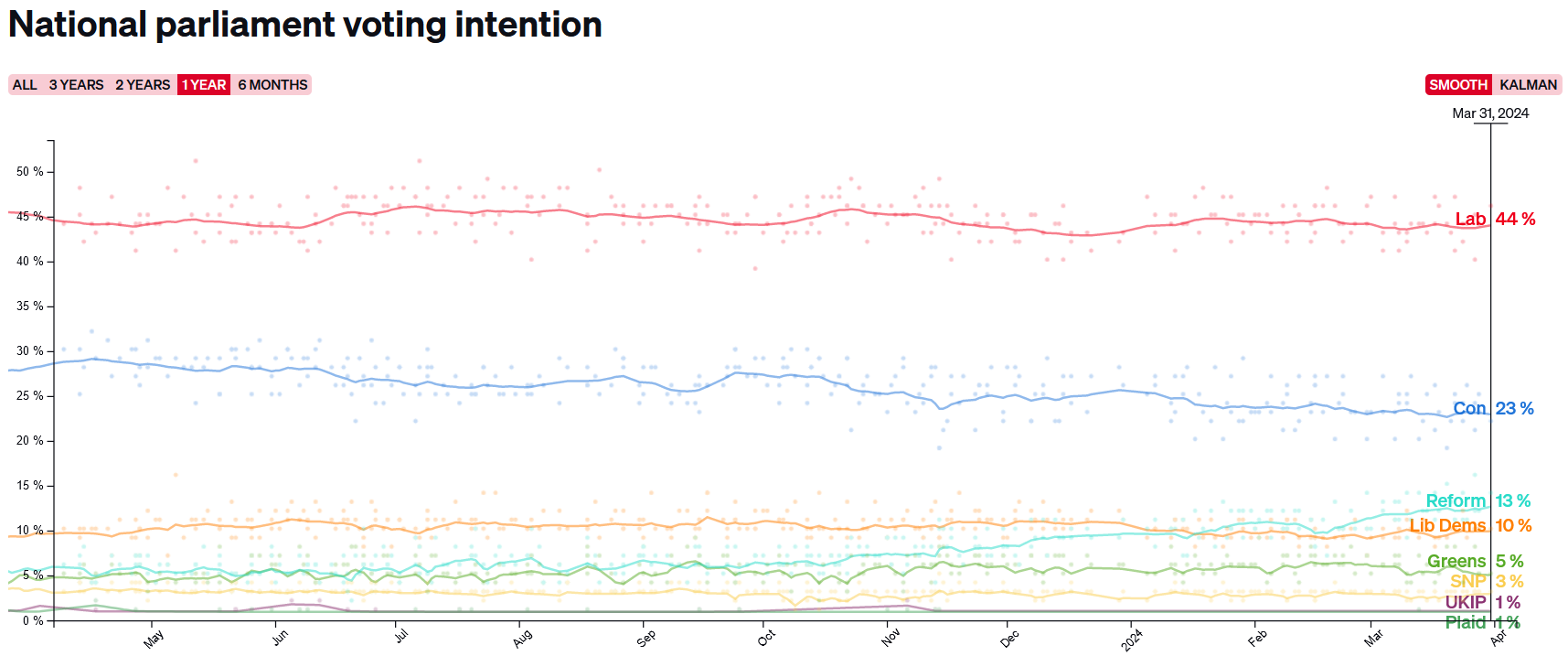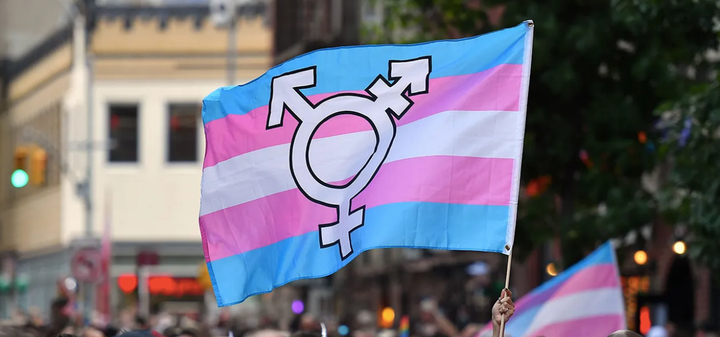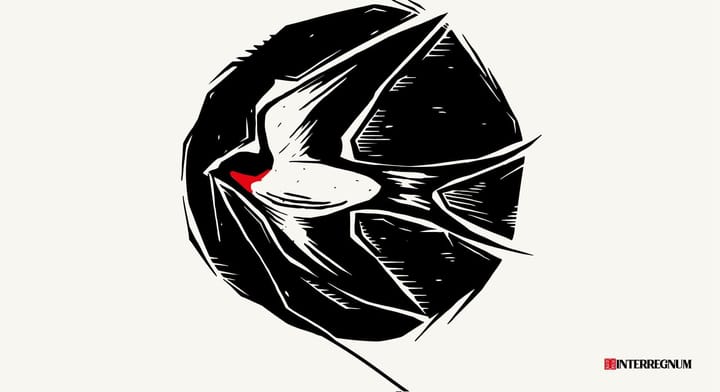Sam Button considers the dilemmas that Western liberal politicians face once fascists have had their brief terms in office.
by Sam Button
Once you let the wolf in the door, he may not be so easily persuaded to leave. Fascism is the wolf, and the electorate are the ones letting him in the door, on the advice of the media, owned and controlled by a decrepit fox.
Former deputy chairman of the UK Conservative Party and human cockroach Lee Anderson has jumped ship to the ironically named Reform Party, on the cusp of a general election. The purpose of this is not to win – that is impossible for a new party in a first-past-the-post system – but to at least claim to deprive the Tories of an electoral majority. Therefore, Anderson makes the case that the future of the party lies even further to the right, as ludicrous as that sounds. This mirrors the (again, ironically named) Liberal Party of Australia’s election of discount Bond villain Peter Dutton as their leader: a ‘National Right’ figure. This shows the sort of lurch to the right that is likely to take place post-election for the Tories. If, by some evil ritual, Reform were to win a majority in parliament, we would be living in Alan Moore's vision of fascist Britain imagined in V for Vendetta. The liberal press have admitted their naivety about GB News, Reform’s unofficial mouthpiece. Might its incredibly fast-paced growth explain why the far-right party is surging in the polls?

The far-right thrives on electoralism. Once fascists have entered government, their spirit lingers like the hangover from hell. You can never go back to how things were, despite liberal promises to the contrary. The case of the USA post-Trump shows how, by tapping in to a neglected voter base of one of the two parties in a two-party system, and mobilising huge swathes of voters through a dumbstruck media, both liberal and conservative, you are a force with staying power. The Republican party has made no attempts to reassess its four years of lunacy, and like Lee Anderson, its elements have sought only to lurch further to the Right. When Dick Cheney’s eldest daughter is considered a ‘voice of reason’, you know your country is in big trouble.
Joe Biden's domestic political impotence comes from a conservative Supreme Court and a House of Representatives with a slim Republican majority. Even without these factors, Biden is not a progressive, and his programme would not alter the fundamental social inequalities that feed the far-right. Regarding the Supreme Court, Amy Coney Barrett alone would be cause for concern, but the deck is stacked in the far-right's favour by design. I do not envy US voters, who are being forced to decide between a willing participant in genocide and an out and out fascist, a reminder of the bipartisan tyranny of US foreign policy. These days feel like living through the last days of the Roman Republic: still an oligarchy, but even the masque of democracy has slipped.
Turning the focus to mainland Europe, Poland's political civil war most starkly demonstrates the dilemmas that (neo)liberal politicians face in the wake of fascism. PiS-aligned Duda remains President of Poland, hunkered down in his palace, harbouring enemies of the state. Farmers protesting, egged-on by Russian astroturfing. Tusk's attempts to purge all elements of PiS from Polish political institutions only serve to rile conservatives more. It was liberal naïvety that caused anyone to have any faith in such institutions in the first place. To fascists, 'constitution', 'rights' and 'democracy' are just words on a page, and can be torn up like paper.
Let’s distinguish between two types of institutions. There are strong institutions, and weak institutions; the former are characterised by inflexibility, the latter by flexibility. Liberal democracy, human rights, and international law are all examples of weak institutions with regards to power. They command surprisingly little power in and of themselves, but can aid in the exertion of power by strong institutions. To give some real examples, they can: grant justification for unjust wars, be things that states sign up to and then ignore, or even deliver Donald J. Trump to the White House. They are based on ideals that lots of people (usually liberals, who are idealists) believe in, and are as powerful as the collective imagination allows them to be. They can also, like all beliefs, be dangerous.
Let's focus on three types of strong institutions in the West: militaries, states, and corporations. This triumvirate represents the real instruments of power, and there is always overlap between the three. The betrayed German Revolution shows us how the state and the military can function both independently and collaboratively. Corporations now, as some have argued, wield more power than nation-states, but depend on state collaboration in order to operate and extract wealth. The military usually gets what it wants, be it peaceful revolution or a regime change. If a corporation wants to remove a forest, it will, regardless of the law. If the state says you are not their problem, you have little recourse to protest.
Let’s turn to the strong institution of the state. Fascism is not, as liberals think, a virus that alters the DNA of a state. Sure, they can change laws when they take power and have constitutions abolished or rewritten. However, the problem is the existence of a centralised State itself, not that it has been ‘corrupted’. The formula within liberal democracies is the same as it has always been: fascists first harness the disaffection and disenfranchisement created by liberal democracies and the economic consequences of their neoliberal policies. After taking power, they expose the state apparatus as the authoritarian instrument that it is and always has been. The state is a weapon no matter who wields it. In the liberal imagination, Donald Tusk or Joe Biden are ‘the good guy with a gun’, to borrow some of the rhetoric of the NRA. The problem is that there is a gun in their hands, and, like Chekov's gun, it is bound to be fired at some point.

Returning to V for Vendetta for its imagery, Adam Susan, the leader of the fascist Norsefire party, is in love with the state apparatus itself. In the form of the supercomputer Fate, an inversion of Project Cybersyn, the state apparatus is roboticised and, through Susan’s fantasies, erotically personified. This reflects the desire of all fascists to court power. One could call this the Will to Power, but there are enough crude interpretations of Nietzsche in the comic book, let alone the internet. It is more accurate to say that fascists fetishise the State. I hate to connect sexuality to fascism, as has so often been erroneously and clumsily done, but in this case there is a grain of truth to the fascist desire to “willingly” take control of a nation-state, particularly when fascists insist on personifying it as female.
The most coveted victory for fascists comes not from, for example, the annexation of Poland, but from the facade of consent that was the Anschluss. Many leftists who would have no doubt resisted had been smashed in the the Austrian Civil War, killed in the Spanish Civil War, or were otherwise suppressed by Nazi forces. Electoralism here is then a performative seduction of the nation. Fascists love nothing more than to have their ideology entertained by civil society, to proliferate through ‘free speech’, to herald the results of mock-plebiscites and pseudo-democratic referendums. I dislike psychoanalysis, but here it can be useful in understanding fascistic desires for a kind of maternal–national incest. Fascists love their country to an erotic degree of obsession, yet they simultaneously imagine their country to be their mother. Hitler presented himself as an ‘austere bachelor, with Germany as his bride’ in Nazi propoganda. Their highest honours invoke Germany as Mother. The nation stands as a singular body to be protected but who also protects. In this way, fascism demonstrates its latent desire to dominate women, making the paradox of fascist women all the more perplexing – but I digress.
To sum up, lingering ‘right-wing populist’ elements from previous governments – to use a liberal euphemism, I prefer to call a fascist a fascist – are more than a mere headache for their neoliberal inheritors. I predict that these supposed guardians of liberal democracy and the rule of law will use increasingly authoritarian means to try to exorcise them, further fuelling conservative resentment and the easy deployment of the rhetorical ‘big lies’ of conspiracy by fascists. This is already happening to an extent with Tusk in Poland, but he is at the very least attempting to undo some of the damage that PiS inflicted. With the UK general election around the corner, we will likely see a ministry in Keir Starmer’s government that does not overturn many of his predecessors’ illiberal reforms. The lopsided status quo will remain the same, the artifice of a return to normalcy will be raggedly paraded, and the state apparatus will be newly oiled and shined, ready for the hand of its next operator.
What then for the Left? In the UK, after Corbyn’s tenure as Leader of the Opposition, many are disillusioned with electoral politics and have been shut out of the Labour Party, both parliamentarily and popularly. However, by not contesting the the far-right at the (increasingly unrepresentative) ballot box, by fleeing the Labour party in droves, are people on the Left handing fascist parties a win? Should we listen to Corbyn’s former campaign director and remain in the tent, in an attempt to have some say over the Labour Party’s direction? I leave it to you to decide. However, I know that the only response to fascism, which will always seek to manufacture the consent of the people, is and should always be direct action.
Further resources:
Strangers in Their Own Land: Anger and Mourning on the American Right by Arlie Russell Hochschild exposes the disaffection and disenfranchisement that led so many rural dwellers in the US to vote for Donald Trump in 2016.
Everyone's favourite libertarian socialist podcast, Behind the Bastards have just released a two-part episode on How Conservatism Won, largely related to the USA but worth a listen.
The Fight for the Republic is a great series by the Iron Dice, aka Dan Arrows, showing how one of the most promising progressive victories in the history of Europe became twisted into the nightmare of Nazi Germany.
Sam Button is a member of the Interregnum collective






Comments ()